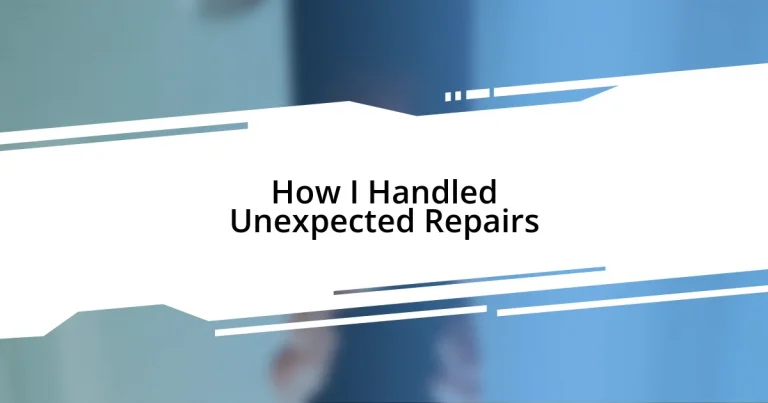Key takeaways:
- Maintaining an emergency fund specifically for unexpected repairs alleviates financial stress and helps in managing unforeseen situations.
- Conducting a thorough assessment of damage is crucial; it allows for better communication with repair professionals and informed decision-making.
- Building relationships with reliable repair services and verifying their credentials can save time and prevent future headaches.
- Documenting past repair experiences helps identify patterns and prepare for future expenses, turning challenges into learning opportunities.
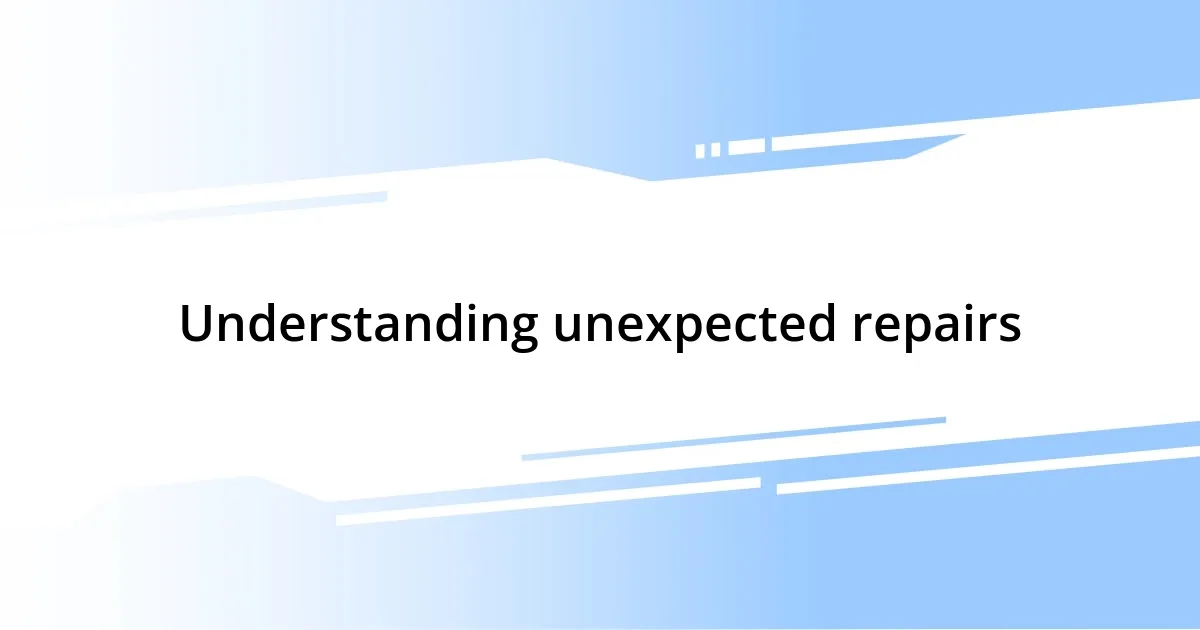
Understanding unexpected repairs
Unexpected repairs can feel like a punch in the gut, can’t they? I remember when my water heater decided to betray me right before a cozy winter evening. The sound of water gushing where it shouldn’t be was not just alarming—it was a reminder of the unpredictability of homeownership. It made me think: how many times have I taken the small things for granted?
What I’ve learned over the years is that these repairs are not just a nuisance; they often come with valuable lessons about preparedness. I’ve started keeping an emergency fund specifically for these situations, and honestly, it takes a weight off my shoulders. Think about it—how would you feel if you knew a little financial cushion could shield you from the shock of a big repair bill?
More importantly, unexpected repairs force us to confront the reality of life’s unpredictability. Have you ever found yourself staring at a broken appliance, heart racing, mind spinning with thoughts of “What now?” That moment of stress often leads to clarity. I found that tackling these surprises head-on has taught me resilience and creativity; solutions emerge when we least expect them.
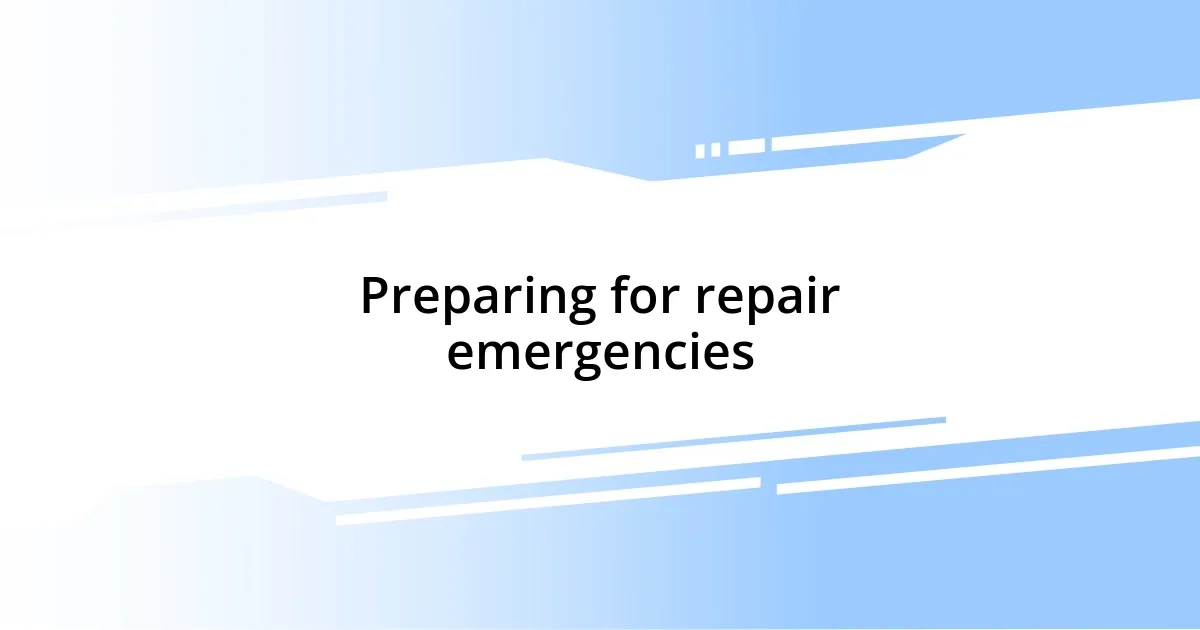
Preparing for repair emergencies
Being prepared for repair emergencies is crucial—trust me, it saves not just your wallet but also your sanity. I recall one evening when my furnace chose to malfunction during a particularly chilly night. I was left scrambling for blankets and space heaters, wishing I had been better prepared. It taught me the importance of having a plan in place for when things go wrong.
To help you get started, here’s what I recommend for your own preparations:
- Build an emergency fund: Set aside money specifically for repairs; it can really ease the panic when something breaks.
- Create a repair toolkit: Keep essential tools on hand for minor fixes; a little DIY can go a long way.
- Know your service providers: Have a list of reliable repair services readily available, so you don’t waste time searching when you’re stressed.
- Regular maintenance checks: Invest time in routine check-ups for your appliances and systems; it’s like giving them a health exam.
- Develop a contingency plan: Think through potential repair scenarios and how you would handle them; being proactive helps you stay calm in the chaos.
Taking these steps transforms the unexpected into a manageable challenge, allowing you to react with confidence instead of panic.
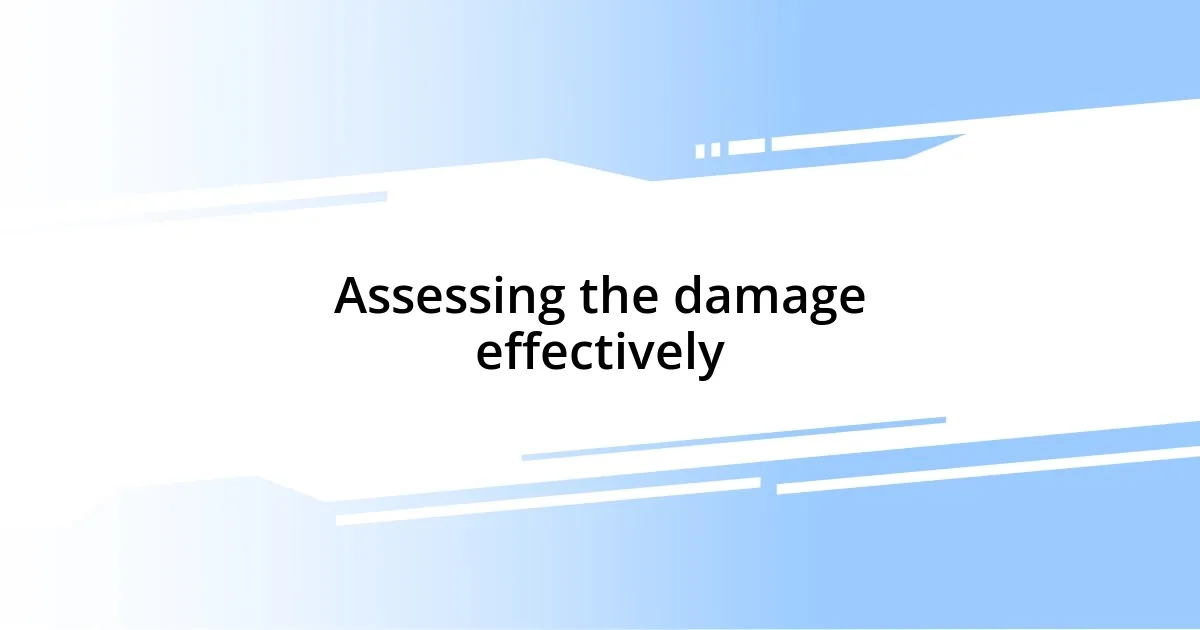
Assessing the damage effectively
Assessing the damage effectively is a critical step that determines how you move forward after unexpected repairs. I remember the time my car’s engine light flickered on right before a long journey. Initially, I panicked, thinking about the myriad of issues it could signify. But I realized that taking a breath and methodically assessing the problem could save me from unnecessary stress. I made a list of symptoms, researched possible causes, and sought professional advice, ensuring I wasn’t just reacting but responding thoughtfully.
When it comes to assessing damage, asking the right questions is key. For instance, what’s the extent of the damage? Is it something I can tackle myself, or do I need expert help? I think back to when my basement flooded; instead of rushing to fix it, I took the time to evaluate the water level, the affected areas, and how it could impact my home’s structure. This assessment not only clarified the immediate actions needed but also helped me communicate effectively with the repair team, ensuring they understood the full scope of the problem.
Ultimately, being thorough in your assessment can prevent you from overlooking critical details. I learned this the hard way after ignoring a small crack in my roof that later turned into a much larger issue. By taking the time to document what I saw and determine its implications, I saved myself from bigger headaches and expenses down the road.
| Approach | Details |
|---|---|
| Visual Inspection | Examine affected areas for immediate signs of damage. |
| Document Findings | Take photos and notes for your records and repair service. |
| Prioritize Issues | Identify which damages need immediate attention and which can wait. |
| Consult Experts | Seek guidance on repairs you’re uncertain about; this can save time and money. |
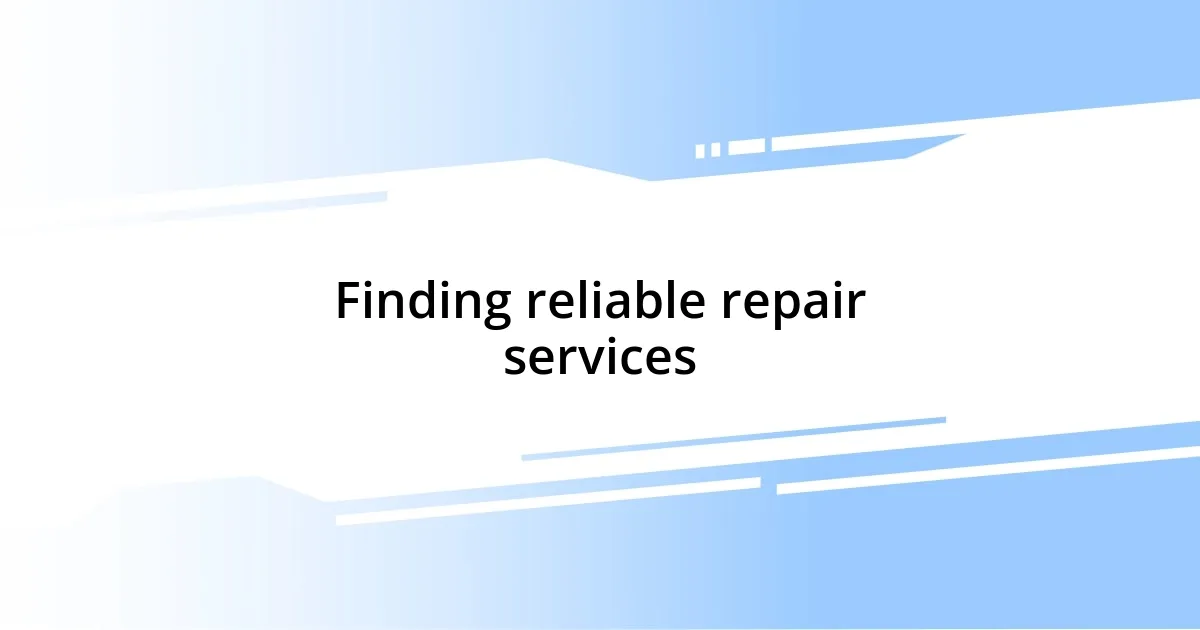
Finding reliable repair services
Finding reliable repair services is often the most daunting part of handling unexpected repairs. I recall the anxiety I felt when my refrigerator suddenly stopped working. I needed to pick a repair service quickly but wanted to ensure I wasn’t getting scammed. A friend recommended asking for recommendations from people I trust, which not only calmed me down but led me to a great technician. Don’t you think it’s comforting to hear about someone else’s positive experiences?
When searching for repair services, I’ve discovered that reading online reviews can be incredibly revealing. One time, I found a highly-rated plumbing service but noticed several reviews highlighted their tardiness. In the end, I went with a different company that didn’t have the lowest price but had consistent praise for their punctuality and professionalism. It’s all about balancing cost with reliability. Have you ever had to choose between saving a few bucks and getting quality service?
Lastly, I emphasize checking credentials and licenses. The first time I hired someone for a significant repair, I skipped this step out of eagerness and ended up with more problems than I started with. Now, I take the time to verify qualifications, especially for specialized repairs. Asking for proof of insurance is also vital—it protects you in case of any mishaps during the service. I genuinely believe that doing thorough research beforehand can save you from headaches down the line. After all, wouldn’t you rather have peace of mind instead of dealing with the stress of an unreliable repair service?
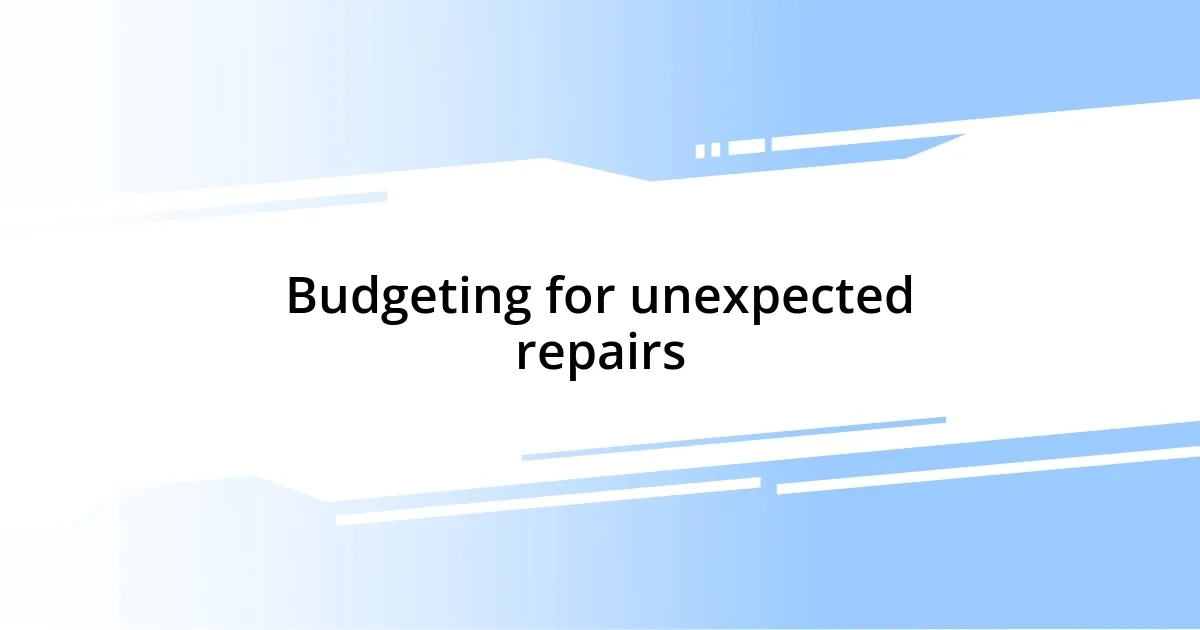
Budgeting for unexpected repairs
Budgeting for unexpected repairs is an essential part of being a responsible homeowner or car owner. In my experience, I learned the hard way that having a financial cushion can make all the difference. There was a time when my plumbing went haywire after a particularly heavy rain. With a leaky kitchen sink and no emergency fund in place, I felt that familiar pang of anxiety. It taught me the importance of setting aside a small monthly amount for unexpected repairs. Now, I prioritize that line in my budget like a bill—it’s non-negotiable.
I often recommend creating a separate fund for these emergencies. Picture it as a safety net. When my air conditioning unit failed in the middle of a scorching summer, I was grateful I had saved up for this rainy day. It alleviated the immediate pressure and made the situation much more manageable. Have you ever faced a sudden repair without the means to cover it? It’s a headache I wouldn’t wish on anyone, which is why I advocate for preparing in advance.
Another strategy is to anticipate the types of repairs you might encounter based on the age and condition of your belongings. For instance, if your car’s getting older, start thinking about potential maintenance costs, like replacing tires or batteries. I’ve seen the shock on friends’ faces when they get hit by large repair bills for unexpected breakdowns. By estimating future repairs, you can create a more realistic budget that not only prepares you financially but also gives you peace of mind. Isn’t it reassuring to know you’re one step ahead?

Communicating with repair professionals
When it comes to communicating with repair professionals, clarity is key. I remember a time I rushed to describe a strange noise my dishwasher made and ended up mixing up the symptoms. The technician arrived with a preconceived notion of what the issue might be, which wasted both our time. Have you ever felt frustrated when your message got lost in translation? Taking a moment to clearly outline the problem can save you from misunderstandings and ultimately lead to a quicker resolution.
Establishing a rapport with your repair professional can make a world of difference. I once had a fantastic experience with a local electrician who took the time not only to fix my outlet but also to explain each step of the process. It felt less like a transaction and more like a collaboration. It’s amazing how asking questions can transform a tense situation into a more relaxed one. Don’t you think that when we engage more openly, the experience becomes more enjoyable?
Additionally, I’ve learned the importance of setting expectations upfront. Whether it’s the timeline for repairs or the cost, being transparent can alleviate any anxiety. I recall a scenario where a technician estimated the job would take an hour, but unexpected issues caused it to extend over several days. While things happen, a proactive conversation about potential delays can prepare you mentally and eliminate unsightly surprises. I invite you to consider how such conversations could enhance your repair experiences.
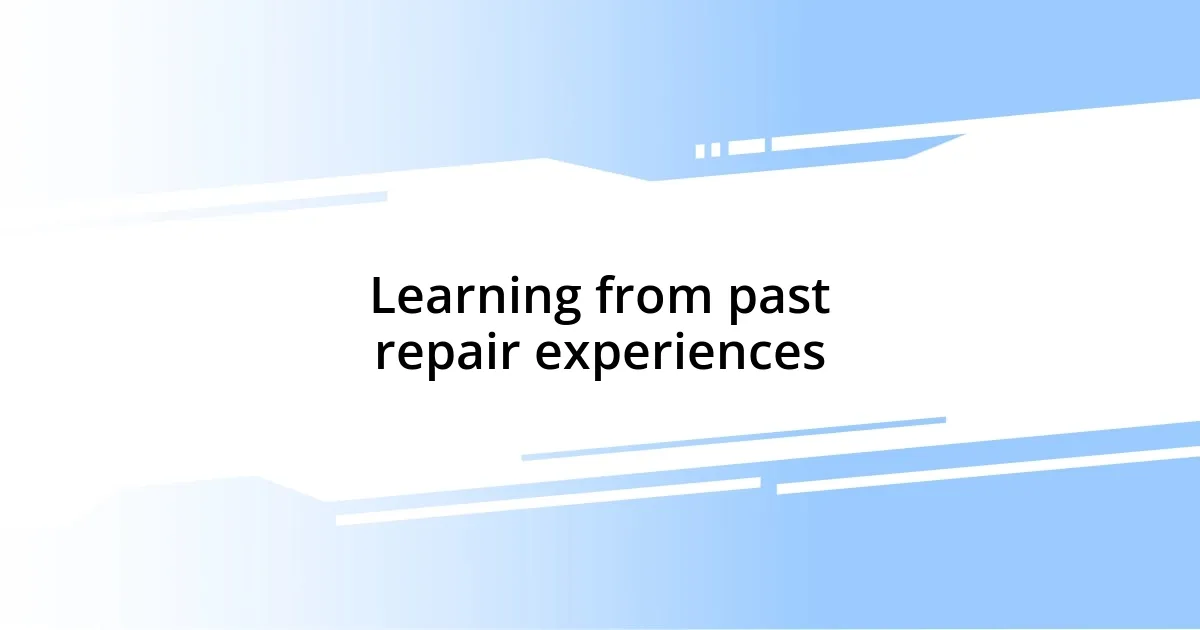
Learning from past repair experiences
Reflecting on my past repair experiences, I’ve come to realize the value of documenting each incident. After an unfortunate event where my refrigerator broke down unexpectedly, I started keeping a log of repairs, including details like the date, costs, and what went wrong. This practice isn’t just about record-keeping; it offers a glimpse into patterns that emerge over time. Have you ever looked back and wished you’d remembered how much a previous repair cost? I find it incredibly useful to anticipate future expenses simply by reviewing past issues.
Another lesson I learned was the importance of connecting emotional responses to these unexpected repairs. After my washing machine started leaking during a particularly busy week, I felt overwhelmed. However, piecing together my experience, I realized that this sense of chaos often came from a lack of preparation. What if we viewed our repair mishaps as opportunities rather than obstacles? This shift in mindset not only alleviated my anxiety but also encouraged me to be proactive in organizing my home and belongings.
Lastly, I’ve learned that sharing experiences with friends and family allows us to gain invaluable insights. I vividly remember discussing a hefty plumbing bill with a neighbor who suggested always hiring a second opinion for significant repairs. That advice stuck with me! Have you ever felt overwhelmed by a repair estimate? By learning from each other’s experiences, we gather a collective wisdom that can guide us through unexpected repairs more smoothly. Embracing these shared stories enhances our ability to face future challenges head-on.












